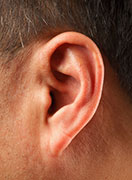
THURSDAY, May 28, 2015 (HealthDay News) — A survey of Hispanic Americans finds older men are at especially high risk of losing their hearing.
A team led by Karen Cruickshanks of the University of Wisconsin, Madison, tracked data from a survey of more than 16,400 Hispanics, aged 18 to 74, in New York, Chicago, Miami and San Diego. The investigators found that 15 percent had hearing impairment and more than 8 percent had hearing loss in both ears.
In general, men and adults aged 45 and older had higher rates of hearing impairment, Cruickshank’s team reported in the May 28 online edition of JAMA: Otolaryngology – Head & Neck Surgery.
The odds of having impaired hearing rose as incomes and educational attainment fell, the survey showed. Factors such as noise exposure, diabetes and prediabetes were also associated with hearing loss.
Experts said the study highlights the threat of hearing loss for Hispanic populations, and possible ways to prevent it.
“Good health care, nutrition, and safe working environments are important for promoting good hearing health in all populations,” said Arlene Romoff, past president of the Hearing Loss Association of New Jersey.
“Treating hearing impairment as a significant health care consideration for the Hispanic/Latino population, hopefully, will translate into better screening for hearing impairment in the general population as well,” she said.
Hispanic men were at special risk, the study found. Among those aged 45 and older, rates of hearing impairment were about 29 percent for men with Dominican background, 41 percent for Puerto Rican men, nearly 18 percent for women with Mexican background, and about 32 percent for women with a mixed Hispanic background.
Do genetics play a role? That’s not yet clear, according to another expert.
“Is auditory deficit different in the study population because of genetic factors or is it cultural based and adversely affected by lower income level and education?” said Dr. Darius Kohan, chief of otology/neurotology at Lenox Hill Hospital and the Manhattan Eye, Ear, and Throat Hospital in New York City.
He also believes that too many people with hearing problems simply put up with condition.
“It is well known that about 40 million Americans would benefit from amplification of their hearing deficits, but only a small fraction seek help,” Kohan said.
Romoff agreed, but added that cost is often a barrier.
She said the new study may help spur “better insurance coverage for hearing aids — currently not covered by Medicare or most health insurance plans.”
More information
The U.S. National Institutes of Health has more about hearing loss.
Copyright © 2026 HealthDay. All rights reserved.

